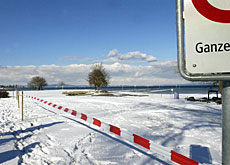Number of H5N1 bird flu cases rises to three

The number of wild birds in Switzerland found to be infected with the deadly H5N1 strain of avian flu has risen to three.
On Monday, a British laboratory confirmed that two dead wild birds discovered on Swiss soil had the highly contagious strain of the disease.
In total, Switzerland has reported 13 cases of avian flu among wild fowl.
The Federal Veterinary Office said the two new cases of H5N1 involved a tufted duck found dead two weeks ago in the village of Steckborn on the Lake Constance shore and a coot on the River Rhine in Feuerthalen.
The first bird found to be carrying the H5N1 virus was a goosander discovered on February 22 at the other end of the country on Geneva’s shoreline.
The Veterinary Office said it expects the test results from the other dead birds to show that they were also carrying the highly contagious strain.
Since February, 468 birds found dead in Switzerland have been tested for the disease.
There were no new cases reported in Switzerland on Monday, but a dead duck with the virus was found on the German side of Lake Constance, leading the Swiss authorities to extend its protective area around the lake.
Strict limits
So far at least 20 cases of bird flu have been reported in the Lake Constance region – nine on Swiss shores.
In this zone, strict limits have been placed on transporting fowl, and poultry farmers are obliged to register any sick bird with the authorities.
The measures are part of an agreement reached by the three countries surrounding Lake Constance at the end of last week.
Six Swiss cantons attended the conference along with one Austrian and two German states and the principality of Liechtenstein.
Delegates discussed long-term measures in the fight against bird flu, including standardising the protection and surveillance of areas around the lake where the H5N1 virus has been confirmed.
Bans
The parties also committed themselves to the systematic collecting of dead birds and in those areas where birds are banned from being kept outdoors, poultry shows and markets are also forbidden.
A Swiss expert at the United Nations Food and Agriculture Organisation, told swissinfo on Sunday that such measures should be effective.
“If confinement of poultry indoors is complemented with the necessary biosecurity measures – making sure that the people handling these animals and the inputs [food and straw] are safe and clean – these poultry establishments can be effectively protected against the virus,” said Samuel Jutzi, director of the FAO’s Animal Production and Health Division.
swissinfo with agencies
Switzerland has reported 13 cases of avian flu among wild birds. No domestic fowl have been infected.
All poultry has been kept indoors since February 20, but the Federal Veterinary Office has no plans to vaccinate domestic birds.
Neighbouring France is the only European Union country to have reported a case of bird flu among poultry, and has started vaccinating birds.
Germany has ordered that all domestic cats be confined indoors, after several contracted the virus, presumably through eating dead birds.

In compliance with the JTI standards
More: SWI swissinfo.ch certified by the Journalism Trust Initiative



You can find an overview of ongoing debates with our journalists here . Please join us!
If you want to start a conversation about a topic raised in this article or want to report factual errors, email us at english@swissinfo.ch.